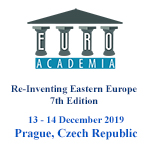Euroacademia Conferences
 Europe Inside-Out: Europe and Europeanness Exposed to Plural Observers (9th Edition) April 24 - 25, 2020
Europe Inside-Out: Europe and Europeanness Exposed to Plural Observers (9th Edition) April 24 - 25, 2020 Identities and Identifications: Politicized Uses of Collective Identities (9th Edition) June 12 - 13, 2020
Identities and Identifications: Politicized Uses of Collective Identities (9th Edition) June 12 - 13, 2020 8th Forum of Critical Studies: Asking Big Questions Again January 24 - 25, 2020
8th Forum of Critical Studies: Asking Big Questions Again January 24 - 25, 2020 Re-Inventing Eastern Europe (7th Edition) December 13 - 14, 2019
Re-Inventing Eastern Europe (7th Edition) December 13 - 14, 2019 The European Union and the Politicization of Europe (8th Edition) October 25 - 26, 2019
The European Union and the Politicization of Europe (8th Edition) October 25 - 26, 2019 Identities and Identifications: Politicized Uses of Collective Identities (8th Edition) June 28 - 29, 2019
Identities and Identifications: Politicized Uses of Collective Identities (8th Edition) June 28 - 29, 2019 The European Union and the Politicization of Europe (7th Edition) January 25 - 26, 2019
The European Union and the Politicization of Europe (7th Edition) January 25 - 26, 2019 7th Forum of Critical Studies: Asking Big Questions Again November 23 - 24, 2018
7th Forum of Critical Studies: Asking Big Questions Again November 23 - 24, 2018 Europe Inside-Out: Europe and Europeanness Exposed to Plural Observers (8th Edition) September 28 - 30, 2018
Europe Inside-Out: Europe and Europeanness Exposed to Plural Observers (8th Edition) September 28 - 30, 2018 Identities and Identifications: Politicized Uses of Collective Identities (7th Edition) June 14 - 15, 2018
Identities and Identifications: Politicized Uses of Collective Identities (7th Edition) June 14 - 15, 2018
The Political Background of a Failed Idea: Peter Ludwig Collection in Bulgaria
-
-

-
Presentation speakers
- Galina Dekova, Sofia City Art Gallery / National Academy of Art, Bulgaria
- Download presentation
Abstract:
The paper will discuss the political background of the rejection of Peter Ludwig’s donation and the Bulgarian authorities’s refusal to participate in the creation of a Peter Ludwig Collection of Contemporary Art in Bulgaria. Bulgaria was one of the famous art collector’s destinations in the 1980s, when he visited artists’ studios and established relations with the political elite. As a result, Bulgarian art from his collection was shown in numerous exhibitions through Europe. Following his engagement for Bulgarian art he expressed the wish to donate a significant collection of contemporary art to the Bulgarian state. The idea was met with a proposal for the inauguration of the first of a kind institution to promote contemporary art in Bulgaria. As it was conceived in the wake of major political changes in 1989, but relied upon structures from the communist past, it could not be realized in the years after. The reasons for the final decision not to go through with it were foremost political, but also personal – the chosen by the donator artistic director Svetlin Roussev had become widely unpopular within artistic and political circles in the late 1980s. The story sank into oblivion and was never made public or discussed afterward. In 2018 I had the chance to work with the archive owned both by Svetlin Roussev and the St. Cyril and St. Methodius International Foundation in Sofia. It allowed me to trace the history back to its main protagonists and decision-makers, and it revealed selection mechanisms, as well as other practices of cultural politics in a moment of harsh political changes.
-
Related Presentations













